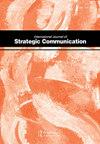Predicting Publics’ Compliance with Containment Measures at the Early Stages of COVID-19: The Role of Governmental Transparent Communication and Public Cynicism
IF 1.9
Q1 COMMUNICATION
International Journal of Strategic Communication
Pub Date : 2022-05-27
DOI:10.1080/1553118X.2022.2039663
引用次数: 2
Abstract
ABSTRACT Despite the agreement on the importance of transparency in pandemic management, few studies have provided empirical evidence to answer the question of how governmental leadership and management teams can communicate strategically in a transparent manner. Integrating public relations, strategic communication and health communication literature, this study examines the effectiveness of CDC’s transparent communication in shaping individuals’ cynicism, self-efficacy beliefs as well as their cooperation during a pandemic, while taking the moderating role of media exposure and political ideology into consideration. A quantitative online survey was conducted with 502 participants who were living in the United States in early April 2020. Results indicated that effective transparent communication could reduce public cynicism and increase public self-efficacy to fight the pandemic, which subsequently leads to more cooperative precautions. Moreover, the relationship between CDC’s transparent communication practices and perceived cynicism toward the institution was moderated by media exposure (i.e., mass media and social media) and political ideology. The findings contribute to the theoretical understanding of pandemic communication and provide implications for practitioners in pandemic management, suggesting that health institutions should guarantee high transparency levels in their communication to encourage public precautionary cooperation.预测公众在COVID-19早期阶段对遏制措施的遵守:政府透明沟通和公众愤世嫉俗的作用
尽管人们一致认为透明度在大流行管理中的重要性,但很少有研究提供经验证据来回答政府领导和管理团队如何以透明的方式进行战略沟通的问题。本研究整合了公共关系、战略传播学和健康传播学的相关文献,考察了疾病预防控制中心的透明传播在大流行期间对个体玩世不恭、自我效能感信念及其合作的影响,同时考虑了媒体曝光和政治意识形态的调节作用。2020年4月初,对502名居住在美国的参与者进行了一项定量在线调查。结果表明,有效的透明沟通可以减少公众的玩世不恭,提高公众的自我效能感,从而导致更多的合作预防。此外,媒体曝光(即大众媒体和社交媒体)和政治意识形态调节了CDC透明沟通实践与对该机构的犬儒主义之间的关系。研究结果有助于从理论上理解大流行传播,并为大流行管理的从业人员提供启示,建议卫生机构应保证其传播的高透明度,以鼓励公众开展预防合作。
本文章由计算机程序翻译,如有差异,请以英文原文为准。
求助全文
约1分钟内获得全文
求助全文
来源期刊

International Journal of Strategic Communication
Social Sciences-Sociology and Political Science
CiteScore
3.40
自引率
0.00%
发文量
39
期刊介绍:
The International Journal of Strategic Communication examines the philosophical, theoretical, and applied nature of strategic communication, which is “the purposeful use of communication by an organization to fulfill its mission.” IJSC provides a foundation for the study of strategic communication from diverse disciplines, including corporate and managerial communication, organizational communication, public relations, marketing communication, advertising, political and health communication, social marketing, international relations, public diplomacy, and other specialized communication areas. The IJSC is the singular forum for multidisciplinary inquiry of this nature.
 求助内容:
求助内容: 应助结果提醒方式:
应助结果提醒方式:


